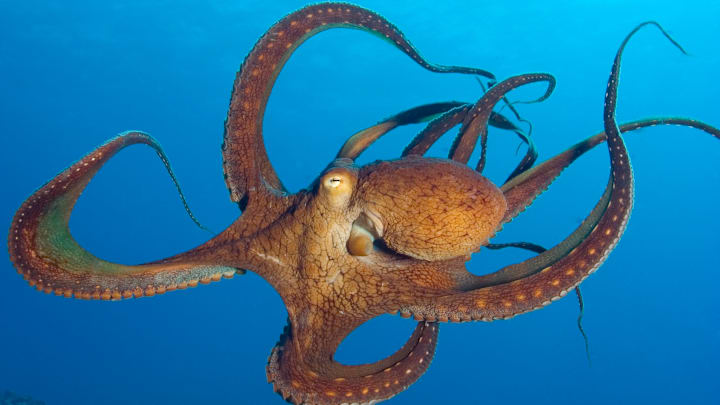Octopuses are extremely smart, with some scientists believing they were the first intelligent species on Earth. In addition to being clever enough to use tools, solve puzzles, do tricks, and recognize humans, the invertebrates are capable of recruiting fish to help them hunt. You can witness the remarkable behavior in the video below.
For their study published in Nature Ecology & Evolution, an international team of scientists captured 120 hours of footage of an Octopus cyanea—also known as the big blue or day octopus—and various fish species in the depths of the Red Sea.
Each member of the unconventional team seemed to have a distinct role. The octopus takes on a commander position, leading a group of fish on the hunt for food and overseeing operations. Meanwhile, the fish track down smaller fish species and mollusks hiding in crevices. Once they’ve signaled their target’s location by hovering above it, the octopus responds by forcing the prey out into the open. When hunting go smoothly, both the fish and the octopus benefit—a phenomenon in nature known as mutualism.
The footage also shows that octopuses don’t take kindly to freeloaders. Some fish species, particularly the blacktip grouper, appeared to let others do the heavy lifting while they waited around for food. In response, the octopus would lunge at them. Some fish would show aggression toward each other but never toward the octopus, implying the cephalopods sit atop the hierarchy.
“Nobody really knew that octopus have this sophisticated social life—not with other octopus, but with other species,” study co-author Iain Couzin, evolutionary biologist and director of Germany’s Max Planck Institute of Animal Behavior, told Popular Science. While the study sheds light on the dynamic ways octopuses interact with other species, it also raises questions. For additional studies, the scientists hope to learn whether octopuses recognize individual fish and investigate how much the fish benefit compared to their eight-armed leaders.
Read More About Sea Animals:
